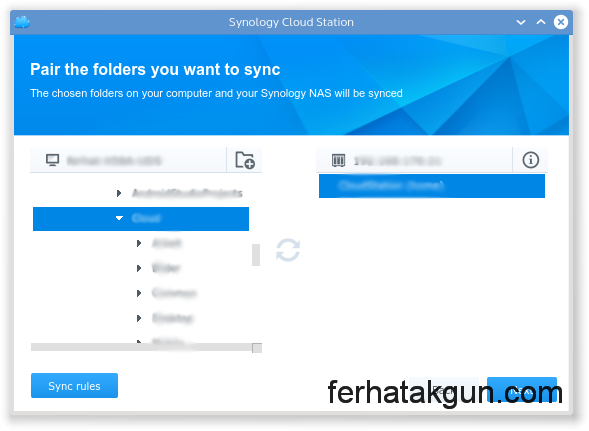
- #Synology cloud station drive will not connect how to#
- #Synology cloud station drive will not connect manual#
Avoiding data loss: Obviously, this is first and foremost.

The Benefits of Backing Up Your Synology DiskStation to the Cloudīacking up your Synology NAS to the cloud gives you a number of advantages, including: Backing up your DiskStation to the cloud means you achieve a 3-2-1 strategy without going out of your way to physically separate the copies.

Keep in mind, backing up to an external destination will require you to physically separate the backup copy.
#Synology cloud station drive will not connect manual#
However, USB backup won’t back up applications or system files, and it’s a manual process rather than automated process. Finally, backing up to a USB device has some advantages-the format of your data is readable, so you can plug the USB in anywhere and access your data. Backing up to a file server is another option, but it will take up more storage space for caching than backing up to another DiskStation. If you recently upgraded to a new DiskStation, your old NAS is an option for storing an additional copy of your data, should you want to. Synology offers a few different options for backing up to an external destination, including another Synology NAS, a file server, or a USB device, and each has pros and cons. Having a copy off-site reduces this risk.

It’s also co-located with your production data, putting it at risk of disaster. Backing up to the same NAS enables speedy restores, however your data is still at risk of hard drive failure.
#Synology cloud station drive will not connect how to#
In this post, we’ll explain how to achieve a 3-2-1 backup strategy, share some of the benefits of backing up to cloud storage, outline different options for backing up your DiskStation, and give some practical examples of what you can do by pairing your NAS with cloud storage. All the time.) In short, you can store backups on a NAS for easy access, but a NAS itself does not constitute a true backup strategy.įor true protection, you need to implement a 3-2-1 backup strategy that incorporates your NAS with at least one off-site copy-and backing up to the cloud is a great way to do just that. Your Synology DiskStation definitely gives you all of those benefits, but your NAS alone doesn’t fully protect your data from things like a natural disaster, a ransomware attack, or a major hard drive failure (And drives do fail. You probably invested in the NAS to enable easier collaboration and access, speed up restores, make files available 24/7, and achieve a level of redundancy you didn’t have before. If you’re using a Synology NAS for your small business or home office setup, chances are your data is important to you. Here's the relevant server block from proxy (NAS is 192.168.0.Editor’s note: This post has been updated since it was last published in 2020 to provide more information on Synology NAS backups. Please check your network settings and try again." I've tried appending :443 and :5001 to the domain as tests they give the same error. However the Cloud Station Backup client is giving error: "Connection failed. All this works fine for the NAS web interface. So far I have the DNS configured to forward to my IP, the proxy is forcing HTTPS and redirecting that subdomain to the NAS. Now however I'm needing to ensure I keep my files backed up while away so I'm wanting to connect via my domain using that wildcard cert on the reverse proxy.

I've also had a Synology NAS on the same network where I've been backing up via Cloud Station Backup using the NAS local IP address. I've had an Nginx reverse proxy setup already for hosting various home projects and keep a wildcard SSL cert on that box.


 0 kommentar(er)
0 kommentar(er)
